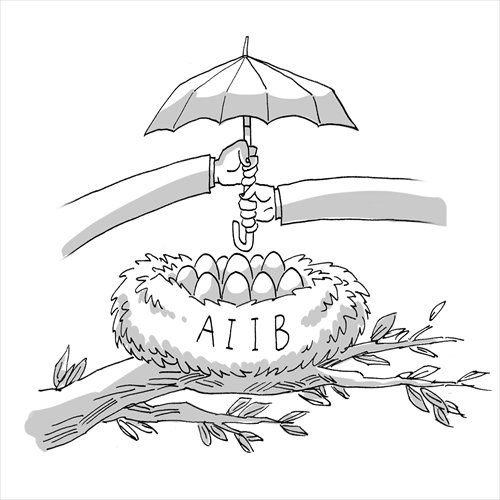China’s AIIB hopes chime with Seoul’s plans

Illustration: Liu Rui/GT
Jin Liqun, president-designate of the Asian Infrastructure Investment Bank (AIIB), met with South Korea's President Park Geun-hye, ministers and vice ministers, and entrepreneurs during his visit to South Korea on September 8-9. He talked about the significance of the foundation of the multilateral development bank, plans for the bank's operation and development schedules. The president-designate also discussed ways to enhance cooperation between AIIB member states, and praised South Korea for its active collaboration in the initial stage of the bank's establishment.
The AIIB chief's choice of Seoul as his first destination not only has great significance in its timing, but also has strategic implications for Sino-South Korean bilateral ties, China's foreign policy and the regional economy.
The Chinese economy has transformed from the stage of torrid double-digit economic growth to that of steady, medium-to-rapid growth focused on quality above quantity. The AIIB will enable China to dump excessive capacity within its economy and to expand its trade markets. The development bank also helps Beijing to maintain its foreign exchange reserves at a reasonable level and to internationalize the yuan.
The China-led bank is also expected to ensure sustained growth of the Asian economies and to strengthen economic cooperation between China and other Asian countries. The investment in infrastructure, including roads, seaports, railways, and power plants, in underdeveloped parts of Asia, will contribute to economic development of the continent.
China's foreign policy under President Xi Jinping's new leadership comes down to the "One Belt, One Road" (OBOR) initiative. The OBOR deepens friendly ties with partner nations while bringing economic benefits to China at the same time.
The AIIB and the initiative complement each other. Membership of 57 countries in the China-led bank, despite opposition from the US, was a diplomatic and economic victory over Washington. The development institution seeks to level the playing field where the US-led World Bank and the Japan-dominated Asian Development Bank are currently most prominent, enabling friendly competition between the banks.
This will keep the US-led global financial order in check and elevate China's status on the international stage. The presence of the China-led development bank will also influence the future improvement in the governance of other multilateral financial institutions.
South Korea has a 3.81 percent stake in the AIIB - the fifth largest among the bank's founding members. Korean firms, equipped with know-how they have accumulated in Middle East construction projects, will actively seek to join massive infrastructure-building projects in Asia, which will lead to remarkable growth.
Joint projects by the AIIB and Korean firms are already underway. Under the AIIB structure, aid recipients must first make a proposal to the AIIB about development projects. Therefore, it is a good idea to make preemptive suggestions that can influence investor states. All the better if South Korean and Chinese firms jointly identify and join projects with good prospects.
South Korea's membership of the AIIB will expand the scope of Sino-South Korean relations from the economy to politics and diplomacy. South Korea is one of the most successful examples of China's regional diplomatic policy of "amity, sincerity, mutual benefit and inclusiveness."
Seoul's friendly ties with Beijing will deliver a positive message to the international community, as well as improving Beijing's image globally.
Seoul should be always ready for the reunification of the Korean Peninsula. Park, in her meeting with her Chinese counterpart Xi, described South Korea's plan to establish a Northeast Asian Development Bank when the condition is right, or, for example, when North Korea is denuclearized. The prospective development bank specializes in Northeast Asian regions including North Korea, the three provinces of Heilongjiang, Jilin, and Liaoning in Northeast China, and the maritime territory in the Russian Far East. I hope the bank can evolve into an institution that complements the AIIB, and in a broader perspective, harmonizes with Park's Eurasia Initiative and the OBOR.
Seoul, despite unstable inter-Korean ties, expects the China-led development bank to play a constructive role in North Korea.
The AIIB represents a successful diplomatic move by China that has made it one of the most prominent players on the international stage. The bank's president-designate Jin stressed in his visit to Seoul that the AIIB will generate a pipeline for capital, technology, and manpower aimed at investing in Asian infrastructure, and the bank will be managed on the basis of transparency, openness, independence and responsibility. The foundation and development of the AIIB marks China's evolution into a global economic leader.
The author is a professor at the Division of International Studies, Hankuk University of Foreign Studies in Seoul, South Korea. opinion@globaltimes.com.cn